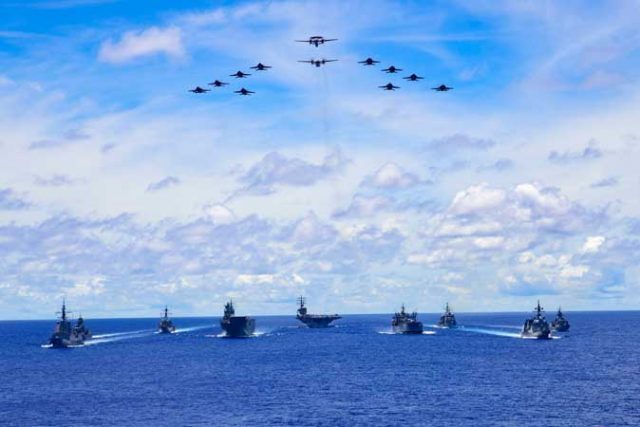
By Kyle Aristophere T. Atienza, Reporter
THE PHILIPPINES under the next administration should enhance its alliances with nations that value international rules to strengthen its claim in the South China Sea, analysts said, noting that Beijing’s continued expansive activities in the disputed waterway indicate that President Rodrigo R. Duterte’s appeasement policy does not work.
The country should “cooperate with like-minded nations” in enforcing an international ruling that rejected China’s claim to more than 80% of the sea based on a 1940s map, Henry S. Bensurto Jr., former Philippine Consul General to San Francisco, said at a BusinessWorld Insights forum on Wednesday.
Mr. Bensurto said it has been “unfortunate” that the focus of the debate on the country’s sea dispute with China has been “whether the arbitration ruling is enforceable or not” instead of “how.”
 Government officials and concerned domestic parties “should focus the debate into how do we enforce it, implement it” with the help of like-minded states, he said.
Government officials and concerned domestic parties “should focus the debate into how do we enforce it, implement it” with the help of like-minded states, he said.
Mr. Bensurto said inconsistencies in the Philippine government’s handling of the sea dispute has enabled Beijing to be a step ahead in terms of planning.
The Philippines has failed to craft a long-term solution for the South China Sea dispute due to its fast-changing political landscape, he said, noting that a Philippine President only has a term of six years.
“One inherent weakness, why, why do we say that China has the ability to be strategic and long term in terms of its policy, because the leaders there lead for life and so a necessary consequence of that is the consistency of policy,” he said. “In a democratic state like the Philippines, where administrations are normally limited by a definite term of six or four years, you will tend to focus on what can be achieved in your six years.”
Mr. Bensurto said the institutional problem can be addressed by freeing several government agencies from the influence of politics or political pressure.
The Department of Foreign Affairs and the Department of National Defense, among other agencies “that provide non-political objective analysis of certain situations, are supposed to be objective and professional in their analysis because of their historical understanding,” he said.
“They will have the ability to think strategically, and so there has to be an effort to strengthen these institutions and insulate them from any politics.”
MULTIPLE POWERS
Last month, China had warned the United Kingdom’s Carrier Strike Group, led by the aircraft carrier HMS Queen Elizabeth, not to commit “improper acts” as it entered the contested South China Sea, according to the BBC.
Britain was also set to participate in multinational exercises with the US, Australia, France, Japan, New Zealand and South Korea in the Philippine Sea.
“The cumulative effect of multiple powers coming in and telling China to care about international law could be positive if it is coupled with good diplomacy,” said Richard H. Heydarian, a professorial chairholder on geopolitics at the Polytechnic University of the Philippines.
“It’s important for the quad power, such as the US, UK, Germany, France, and other countries, to come up with a strategy to tell China that if you want to be a respectable leader in this part of the world, you have to regain our trust and confidence and one way to do that is to tone down some of your excesses in the South China Sea and move towards a rules-based order in that area,” he said at the same forum.
Mr. Heyderian said the latest moves of the UK and its allies against China indicate that Southeast Asian countries, including the Philippines, have failed to challenge Beijing’s aggression in the waterway.
“ASEAN (Association of Southeast Asian Nations) is not stepping up to the plate that’s why the quad powers are stepping in and saying that, well, if you’re not going to do your job, we’re gonna do that job for you,” he said.
“They are not happy about some of the excessive and coercive behavior of China.”
“Our appeasement foreign policy has weakened our position and there is no way but to reverse this policy by alliances and harnessing the international community that values the rule of international law to govern relations among responsible global stakeholders,” Victor C. Manhit, president of think tank Albert del Rosario Institute for Strategic and International Studies, said in a Facebook Messenger chat.
Mr. Manhit echoed the calls of several legislators to let Philippine forces conduct joint maritime patrols and military exercises in the waterway, in the face of China’s continued aggression.
Mr. Duterte, who led a foreign policy pivot toward China and away from the Philippines’ western allies, last month recalled a plan to end the visiting forces agreement with the US after meeting with US Defense Secretary Lloyd Austin.
Henry Ll. Yusingco, a research fellow at the Ateneo Policy Center, said the next administration should consider a return to the multilateral approach in crafting a foreign policy.
“As far as matters in our region are concerned, promoting and upholding ASEAN centrality will have to be the main strategic approach,” he said.
RESOURCES
The Philippine Energy department recently said the proposed joint exploration for oil and gas between the Philippines and China in the disputed area can still move forward.
Food security and marine conservation should be “the primary consideration” as far as the utilization of the resource-rich waterway is concerned, Mr. Yusingco said.
“Any exploration partnership, apart from meeting constitutional requirements, must respect these two considerations,” he said. “It behoves the next administration to formulate a coherent and comprehensive marine policy first before embarking on any joint effort to exploit our seas.”
Allies key to PHL’s claim in South China Sea
Source: Bantay Radio
0 Comments